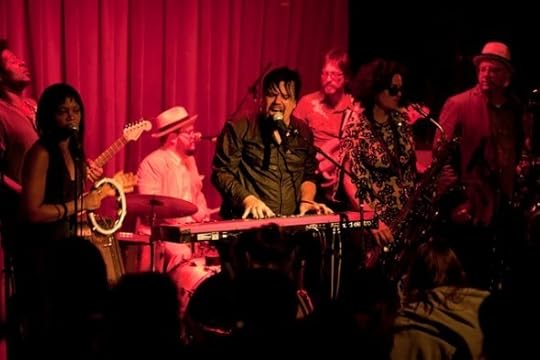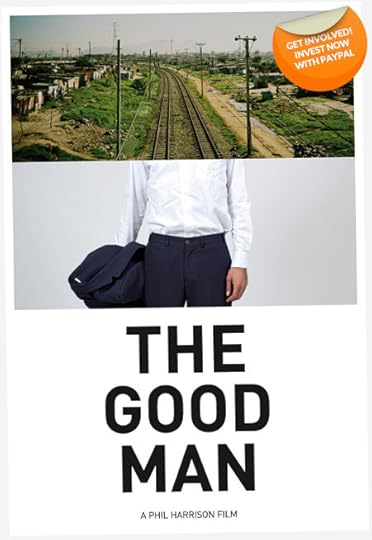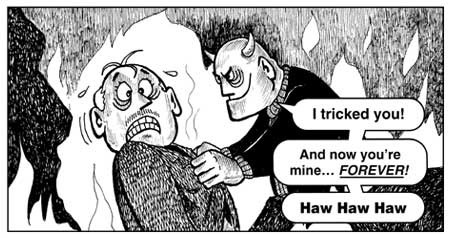Peter Rollins's Blog, page 47
November 27, 2011
Faith ≠ Certainty, Doubt or Belief
The word "faith" is a much misunderstood term. In contemporary discourse it often means the act of believing in something that lacks empirical evidence, something that one affirms through intuition, the interpretation of a particular personal experience or the interpretation of a publicly observable phenomenon. However the term, in its more theological sense, has much more in common with a particular way of living.
It could be said to be an act of protest against the type of philosophy that Paul condemned in the Bible. The philosophical wisdom tradition has always been deeply marked by the idea that life simply is and that we should not impose meaning on it. While we tend to experience certain people as special and invest particular activities with significance (e.g. eating with someone we love) such a view claims that people are just people, that the meaning we see in the world is something we impose upon it and that the universe is simply made up of uniform particles (or vibrations etc.) occupying locations in space and time.
To speak of faith is to refer to a protest against such wisdom. What is important to bear in mind however is that this protest does not necessarily disagree with such a position any more than it agrees with it. To live in faith is to live as though the world has meaning, as if matter is special, as if what we do is significant. It has then nothing to do with belief, doubt or certainty but rather with a particular mode of living as-if.
Some theologians thus use the word "faithing" rather than "believing" to get to the heart of what Paul meant when he spoke of how we approach the divine. In this reading we are not believers but rather faithers. The notion of believers or unbelievers thus falls away in light of the question as to whether we are faithers or unfaithers. In other words, whether we engage with the world as infused with meaning, wonder, enchantment, mystery, divinity and beauty, or whether we don't. It refers to a way of participating with reality in a different way, not believing an alternative mythology.
Faith thus exists in a different register to the categories of belief, doubt and certainty. It exposes the implicit impotence of these categories when applied to the event of Christ. To have faith is to see differently. Indeed the word "mystic" might be appropriate here as the term suggests closing ones eyes in order to see. The person of faith metaphorically closes their eyes to the wisdom that sees the world as without significance in order to see it as saturated with significance.
This is not however something we can muster up; we can't simply tell ourselves to see the world in this way, it requires being taken up in love. To grasp this take a moment to think about how those who love the world cant help but experience it as meaningful even if they believe that it is not. Just as those who do not love cannot help but experience the world as meaningless even if they believe that it is in fact meaningful.
Faith then is the experience of being taken up in the experience of meaning, of feeling the world to be wonderful, the other as sublime and our neighbour as worth dying for. We cannot will such a way of engaging with the world into being, at best we can invite it, hope for it, wait for it, pray and weep for it.
November 23, 2011
Utah Valley University, Utah
November 22, 2011
Southeastern University, Florida
I will be giving a lecture as part of the Institutions Christ, Culture and the University series and a workshop. More information to follow
November 18, 2011
Building on Fire: The Theory and Practice of Pyro-Theology
I am very excited to officially announce that I will be leading a retreat in the North Coast of Ireland from the 13th – 15th January 2012. During the time we will delve into my recent work in Insurrection and beyond. In addition to talks, workshops and in-depth discussion there will also be music, walks, socialising and a chance to soak in the amazing coastline (pictured above).
The retreat itself will be facilitated by Corrymeela; an important peace and reconciliation community that operate out of a beautiful property overlooking the Atlantic Ocean.
Over the course of the three days there will be six main sessions,
—
The Problem 1: Original Sin and the Invention of "God"
The Problem 2: Storycrime
The Solution 1: The Idolatry of "God"
The Solution 2: The Tribe Of No Tribe
The Enactment 1: Dis-courses
The Enactment 2: Transformance Art
—
This event is limited to fifty people and aims to provide an exploration of theory and practice that will be useful in the formation new communities or the transformation of current ones. If you would like to register click here
November 8, 2011
Book Symposium on Insurrection
Over at the Church and Postmodern Culture website there has been a book symposium exploring Insurrection. This involved two reflections on my work followed by two responses by me. In addition to this Moody has offered two more important contributions to the debate on her website. Here are the different articles in case you missed them.
Becoming Church Mice By Katherine Moody
I Don't Need To Doubt, Peter Does That For Me By me
The Poet and the Critic By Katherine Moody
Review of Peter Rollins' Insurrection By Jason Clark
Ten Thousand Angels Are Not Enough By me
Jason Clark and Pete Rollins on the Insurrection By Katherine Moody
Hope you enjoy the discussion and add your own contributions
November 3, 2011
Creating a Cell: Start an Insurrection in Nine Easy Steps
To help you work through Insurrection with friends in a way that will enable you to extract the most out of it I have pulled together a series of videos that will help you to facilitate a book study. I appreciate that this text might be a controversial one to introduce to groups, however I would encourage you not to let this discourage you from doing it (or any other potentially controversial material).
Often book studies involve a group of people reading some material and then talking about what they agree with and what they disagree with. The problem here is that agreement and disagreement are responses that arise as a result of judging from the position of an already pre-established system. Insofar as the book agrees with our position we agree with it and insofar as it deviates from what we already take to be true we disagree. Insurrection was written with a different aim in mind, here I am attempting to disturb the readers pre-established system of belief, to splinter it and short circuit our tendency to take a Gods-eye position in relation to what we read. In this book I seek to offer the reader a type of mirror that confronts the reader with themselves in a disturbing and challenging way.
The reason for bringing people to this difficult desert of fracturing and self-reflection is not to make them doubt what they assert to be true or bring them to a point of darkness and despair. Rather the book invites the reader to ask whether they are already full of doubts, darkness and despair but strive to repress this knowledge because of fear; pretending to themselves and everyone else that they are healthy when sickness prevails.
Insurrection explores the reality of this repression and shows how such a refusal to face ourselves does not bring freedom from the sting of our brokenness but simply drives it underground (where it arises in other ways, such as in self-loathing, criticism of others, over-eating, over-working, drug abuse, destructive relationships etc.).
Because of the demands of the text and the affective nature of the questions it raises a book study might open up lots of difficult questions and anxiety. But that also means that it might actually be an engaging, productive and even transformative journey.
So I invite you to have courage, take the plunge and see what happens…
The full book study album can be found here. It is made up of twelve videos to be shown over nine weeks,
Week 1 – There is a Fire in the Building; Please Step Inside (Part one), (Part two)
Week 2 – I'm a Christian! I'm a Christian
Week 3 – To Believe Is Human; to Doubt, Divine
Week 4 – "I'm Not Religious" and Other Religious Sayings
Week 5 – I Don't Have to Believe; My Pastor Does That for Me
Week 6 – Story Crime
Week 7 – We Are Destiny
Week 8 – I Believe in the Insurrection
Week 9 – Neither Christian nor Non-Christian (Part one), (Part two), (Part Three)
When going through each chapter it might be helpful to keep the following questions in mind,
What was the overall message of the chapter
How does it relate to what went before it
Where did I find myself challenged
Where did I find myself angry, happy, frustrated, liberated
Does this change how I experience the world in any way
Is there something I must try and rethink or change in light of this chapter
October 27, 2011
Meet the Instant Pentecostal Apostle
Since moving to the US one of my favorite places to hang out has been Union Pool in Brooklyn on a Monday night. Each week the Reverend Vince Anderson lights up the stage with his Love Choir from 11:00pm till early the next day.
It is always a stunning event with regular guest musicians, energetic performances and pentecostal style fervor.
Over the years the Reverend has become such a household name in Williamsburg with his unique style of "dirty gospel" that Sixpoint Brewery recently invited him to preside over the crafting of a new beer. A beer that he would name and which would be sold exclusively in the bar he plays at.
I often get asked (OK I never get asked) what my favorite beer is. Well I am going to tell you anyway… it has to be the Instant Pentecostal Apostle (IPA)
Enjoy the making of and I hope to see you at the gig some day
October 25, 2011
The Good Man – Be Part of a Growing Community Invested in Politically Informed Cinema
Last year my friend Phil Harrison took many of us by surprise when he wrote, directed and released a short film entitled Even Gods.While it was produced with virtually no budget and represented one of his first ventures into the world of film it offered a deeply poignant reflection on the themes of loss, estrangement and reconciliation. Indeed it quickly went on to pick up the "Best Irish Short" at the Galway Film Festival (2011) and the "Short film Award" at the Belfast Film Festival (2011).
Since then Harrison has been working hard on getting a feature film off the ground called The Good Man, inspired by his travels through South Africa and his interest in community protest movements. Things are falling into place and they have secured (The Wire, Game of Thrones) as the lead.
The Good Man represents a new kind of filmmaking, one in which a community of people (from interested individuals, cast and crew, production companies and township residents) have a stake in the film. As such the producers have created 400 shares at £150 each. Those who would like to support the project and invest in its potential can buy one or more of these depending on their budget and interest. Already 300 shares have been snapped up.
I am excited about this project, love its grassroots community investment ethos and am convinced that what Harrison creates will be provokative, entertaining and thoughtful.
If you would like to find out more I recommend you start by watching Even Gods. Then check out The Good Man website. If this is something that captures your interest, as it does mine, then I would encourage you to consider joining others who are supporting this venture by making a small investment.
October 15, 2011
Prayer Works
A friend recently shared the following story with me (via her as yet unpublished novel),
—
One evening, just before bed, a little boy was saying his prayers with his Mother on one side and his Grandmother on the other,
"Please bless my Mommy, Daddy and Grandma," he said, "and help us all get a good nights sleep"
Then he looked up for a moment and shouted, "AND DON'T FORGET TO GET ME A NEW RED BYCICLE FOR CHRISTMAS"
His Mother was shocked and said, "You don't need to shout dear, God isn't deaf"
"I know that," replied the little boy, "But Grandma is"
—
This little story can perhaps help us to understand the underlying structure of prayer. In prayer we speak out to another and yet there is a second form of communication taking place simultaneously: we are also speaking to ourselves.
We need to do this because we are a little deaf. It is only through speaking out that we put into words some of our deepest fears, longings, joys and hopes. As we put them into language we begin to hear them for the first time ourselves and gain more insight into our feelings. We are thus, in effect, having two conversations.
Until we have articulated these feelings in such a way they remain a mystery to us. Prayer thus acts as a mode of revelation, not simply revealing our inner world to some presence "out there", but of revealing this inner world to ourselves.
This structure is not a theistic one. The very same process is at work in the act of imagining what we would say to someone we love or hate. We go through the conversation in our minds, speaking as if to the other. But in so doing we hear things about our own feelings that we were previously deaf to. We see this in the "I wish I had said…" statement when we think of something we would like to have communicated to a person. The point is that we often don't feel the need to actually go back and say the thing we are thinking for the act of saying it to ourselves (imagining the conversation) is enough.
This structure is witnessed clearly in the act of writing letters that we do not end up sending. While we are ostensibly writing for another, communicating outwards, the fact that we do not send the message shows us who the real addressee is: ourselves.
The question of prayer so often revolves around specifically religious issues such as whether there is a being to hear the prayers or why one needs to say anything at all (after all, if God exists, then God would know already what we want). But by bracketing these questions out for a moment and examining the underlying structure of prayer – a mode of communicating to an other (real or imagined) that results in a revelation of our feelings to ourselves – we can see that this is a universal act, one that transcends the theistic/atheistic debates.
I am a great advocate of this form of communication; indeed it has been a lifeline to me many times over the last few years. Every day has been filled with prayer as I take time to speak out in order to come into contact with what lies within. It has provided the backbone of my intellectual project over the years as well being invaluable to my emotional wellbeing.
When we speak out to the divine, or to those from whom we are distant, the ones we have lost to death or misunderstanding, those who we long to communicate with and yet cannot, we speak to something deep within ourselves. In doing this we bring into language that part of us which otherwise would continue to fester within our being and poison us. We bring light to something that would otherwise continue to lurk in the darkness of our unconscious and continue to plague us. And so, regardless of ones belief in the supernatural, we might be able to all agree that this kind of prayer works.
October 14, 2011
Behind Door Number Three…
There is an old story in which a man, who has spent his whole life pulling the legs off bugs, dies and goes straight to hell. After the paperwork has been filled out he is sent to the relevant part of Hades to receive his punishment.
As he is walking the demon who leads the way tells him that because his sin isn't too bad he will get to choose between three alternatives.
He is then brought to a corridor with three doors and told that he can decide which room to spend eternity in. The demon opens the first door and the man is greeted with the sight of around a dozen people standing in a pool of excrement that reaches up to their shoulders.
Then he is led to the second room, which is like the first in every way except this time people are standing in excrement that reaches up to their waists.
Finally the demon shows him the third room, which is similar to the other two. Only this time the excrement barely reaches the inhabitants knees. In addition to this everyone is chatting, drinking cups of tea and eating digestive biscuits.
The young man quickly makes his decision, choosing the third room. His guide shrugs his shoulders and leads the way. Sure enough the man is given a nice hot cup of tea and a biscuit by one of the demons in charge. But after a few minutes a horn sounds and the demon shouts,
"Right lads, tea breaks over, back on your heads"
It is not hard to picture the task of decision-making regarding political systems as taking place in a similar environment. Each room stinks but we got to choose one. Of course, in reality, no single individual chooses which door everyone has to walk through. This is decided through a complex set of processes over which we have little input.
But most of us, if presented with the choice, would pick the room with the best conditions; the one with a little s**t but also with some nice tea and biscuits. And perhaps that is the room we, as a society, chose. It is a room that promised certain benefits and delivered on them. But then, just as we were getting comfortable, we got turned on our head.
Occupy Wall Street can look like one segment of society standing against another. And no doubt that is how many people on both sides of the debate experience it. Yet perhaps we can look beyond that and see this as transcending the usual political lines. Viewing it as a demand for genuine political discourse that enables the poor to put real alternatives on the table. Not idealistic alternatives, but alternatives which don't involve sitting around waiting for the next economic tea break, alternatives which consider different ways to ensure so many people don't have to spend so much of their lives face down in the s**t.
Something that people who care about society will welcome regardless of political stance.
Peter Rollins's Blog
- Peter Rollins's profile
- 314 followers











